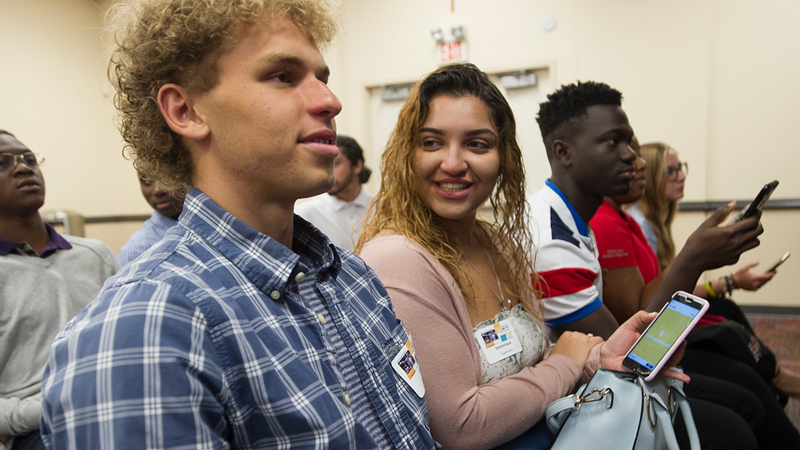Do you have a bachelor's degree in English, Literature or Writing and are you looking to become an English teacher or enhance your expertise as an educator in this subject area? The Master's Degree in Curriculum and Instruction with a Specialization in English is designed especially for middle school or high school English or Literature teachers who are looking to enhance their subject area expertise while developing the latest knowledge in curriculum and instructional strategies.
Curriculum and Instruction (MS)English Education Specialization
Who the English Specialization program is for:
- Current English, Literature or Writing educators teaching in the middle or high school setting who are looking for professional development to become a curriculum or instructional leader in the area of English education.
- Individuals who already hold a bachelor's degree (in English, Literature or Writing) who want to become a middle school or high school English teacher.
- Substitute teachers, career changers, retired military personnel, school paraprofessionals, and others with bachelor's degrees in the area of English, Literature or Writing who want to teach.
- Those interested in teaching at the college level.
*This program requires prerequisites in English, Literature, or Composition.
CurriculumCourse Descriptions
Core Courses
-
Through the study of the basic principles of curriculum development, educators and curriculum leaders are provided with knowledge, skills, and experiences to be actively involved in multiple facets of curriculum development, including planning, design, developmental processes and approaches, implementation, evaluation, and improvement/change. Development of curriculum will systemically address technology integration, evidenced-based practices, innovative and collaborative learning experiences, and the impact of social, political, psychological, and economic factors.
-
Requires students to identify a research problem, develop a design for the study and write a research proposal. Provides opportunities to evaluate and interpret research literature.
-
Advances the concepts, ideas, and professional learning gained throughout the MS Curriculum and Instruction program of studies. In addition to weekly class sessions, field-based experiences include completion of a content-based applied action research project under the guidance of University faculty in the College of Arts and Sciences. This is the capstone course in the MS in Curriculum and Instruction.
-
This course surveys historical and current trends in educational curriculum development and their impact on public and non-public schools from an instructional leadership perspective.
-
This course will prepare educators to be proficient in the application of a variety of instructional strategies. A study of pedagogical models will provide the foundation upon which educators can reflect upon best practices and meet the needs of diverse learners.
-
This course is designed to provide the experienced teacher with a comprehensive perspective on the principles of mentoring and coaching. Class sessions will focus on providing awareness of the knowledge base related to mentoring, as well as a set of mentoring skills and various strategies for applying the functions and behaviors associated with effective mentoring. Individuals responsible for the planning and implementation of teacher induction and orientation programs will also benefit from this course.
-
This course includes the design, development, reflection, and restructuring of classroom instruction based on students' performance and assessment data. Current models used to assess students' learning are examined, including the use of performance criteria. Issues impacting this role and the restructuring of standards-based instruction based on students' performance, progression, and learning are the focus.
English Specialization Courses
-
In-depth analysis of advertisements, speeches, film, and literature as persuasive texts. Students will learn both the nature and scope of persuasion and be introduced to several different methods for analyzing the argumentative strategies of texts. Among these are the traditional, Burkeian, sociological, feminist, and postmodern perspectives. Students will also consider the ethical, aesthetic, and political problems raised by texts designed to persuade an audience.
-
In-depth study of selected Shakespearean plays and poems. Emphasis on the author's artistic development.
-
Examination of film history and film forms as part of a larger cultural history. Clarification and differentiation of the connections between film and literature. Exploration of the ways literary concepts are interpreted through film.
-
In-depth study of selected literary topics, works, figures, and genres.
-
In-depth study of selected works of the period.
-
This course focuses on the application of instructional strategies for teachers of English at the middle and secondary levels. Organization of courses, sources of materials, textbooks, methods of teaching English are addressed. Required of all students in the M.S. in Curriculum and Instruction with English Specialization.




















